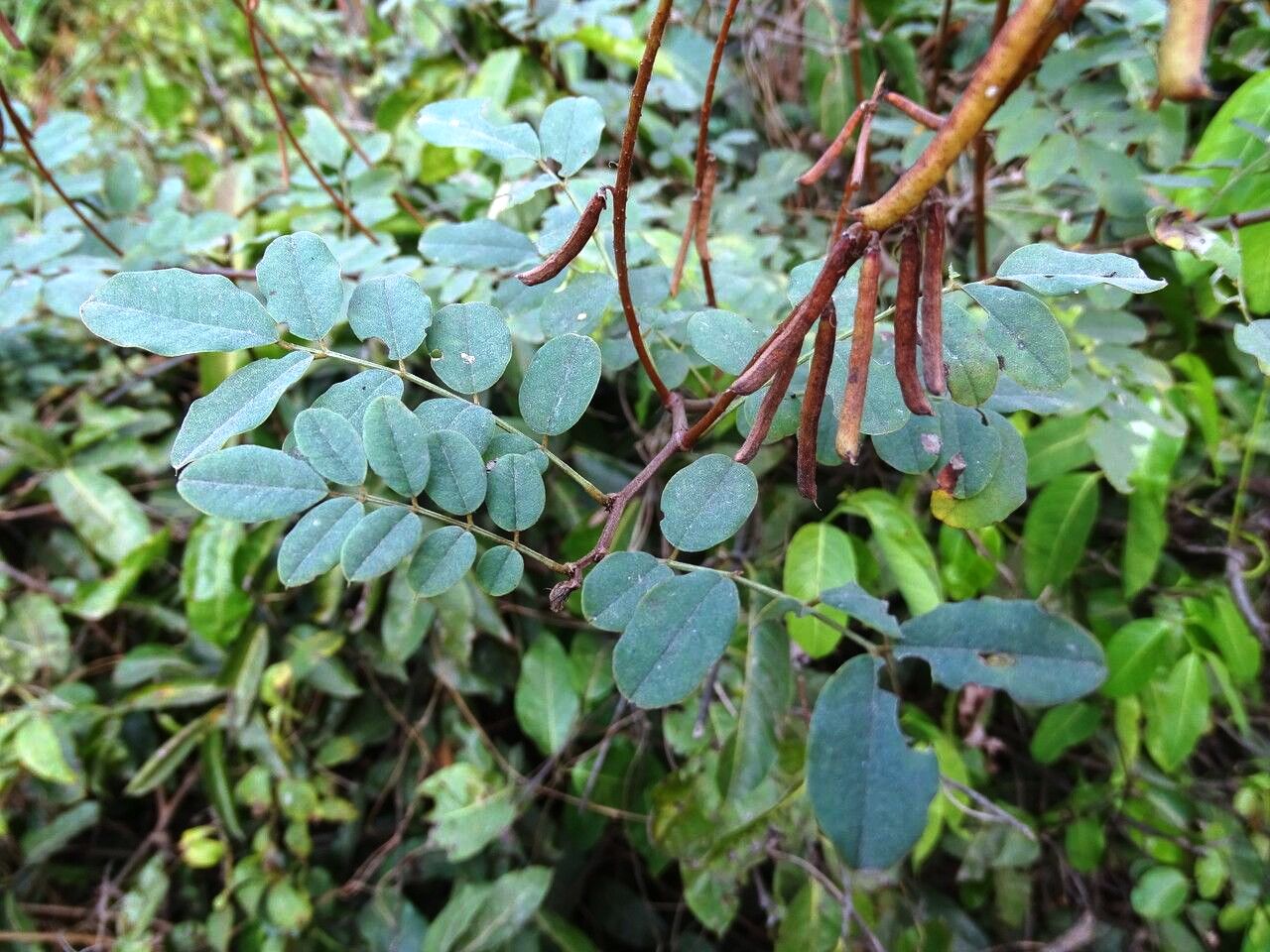Senna podocarpa

|
|
Senna podocarpa Common Names: Senna, African Senna, Podocarpa Senna Scientific
Classification Kingdom: Plantae Phylum: Tracheophyta Class: Magnoliopsida Order: Fabales Family: Fabaceae Genus: Senna Species: S. podocarpa Synonyms: Cassia podocarpa Guill. & Perr., Senna podocarpa var. podocarpa Morphological Description Senna podocarpa is a shrub or small tree, typically growing 1.5–3.5 m tall,
occasionally reaching 5 m in favorable conditions. Its key features include: · Stem: Erect, smooth, greyish-brown, branching from the base · Leaves: Pinnate, 20–40 cm long, with 6–12 pairs of elliptic to
oblong leaflets, 3–8 cm long, 1.5–3 cm wide, dark green, glabrous · Flowers: Bright yellow, 2–3 cm wide, arranged in terminal or axillary
racemes, blooming during rainy seasons · Fruit: Flat, curved pods, 10–15 cm long, 1–2 cm wide, green turning
brown, containing 10–20 flat seeds The plant’s vibrant
flowers and robust structure make it a notable presence in its habitat (Fern,
2024). Distribution and Habitat Senna podocarpa is native to West Tropical Africa, with a range spanning
Senegal, Gambia, Mali, Ghana, Nigeria, Togo, Benin, and Sierra Leone. It
thrives in: · Ecosystems: Lowland savannas, forest edges, riverbanks, and disturbed
areas · Climate: Tropical, with rainfall of 800–2,000 mm annually and
temperatures of 22–34°C · Soils: Sandy to loamy, well-drained, often in nutrient-poor
conditions It is frequently found
in secondary growth areas and along watercourses, adapting well to
human-modified landscapes (Burkill, 1995). Ethnopharmacology Senna podocarpa is esteemed in traditional medicine for its diverse
therapeutic properties. The leaves and pods are primarily recognized for their
purgative effects, serving as natural laxatives akin to those derived from
Senna alexandrina. Additionally, the leaves are utilized in treating gonorrhea
and as a remedy for Guinea worm infections, where a paste made from pounded
leaves is applied to affected areas. The pods are employed in addressing skin
ailments such as eczema, scabies, and ringworm. Furthermore, the leaves, when
reduced to ash and combined with shea butter (Vitellaria paradoxa), are applied
externally to alleviate arthritis and rheumatic pains. Phytochemical analyses
have identified compounds like rhein, chrysophanol, and emodin, which
contribute to the plant's antifungal and antibacterial activities. Scientific
studies support these traditional uses; for instance, formulations like Senna
podocarpa emulgel have demonstrated efficacy in promoting the healing of
chemical burn wounds. · Antifungal and Antibacterial: Methanol extracts from S. podocarpa leaves
have demonstrated inhibitory effects on several bacterial strains, including
Pseudomonas aeruginosa, Streptococcus faecalis, Klebsiella pneumoniae, Shigella
dysenteriae, Staphylococcus aureus, Micrococcus luteus, Salmonella typhi, and
Bacillus cereus. Notably, the extract was ineffective against Escherichia coli.
Zones of inhibition varied from 3 mm in S. aureus and M. luteus to 28 mm in
Candida albicans. Minimum inhibitory concentrations (MIC) ranged between 15
mg/mL and 30 mg/mL. The extract's mechanism appears to involve inducing
potassium ion leakage from bacterial cells, suggesting a disruption of cell
membrane integrity. (Ogundare et al., 2009). · Anti-inflammatory and Analgesic: In Mali, leaf pastes reduced paw edema in
rats by 40% at 150 mg/kg, supporting use for arthritis (Ojewole, 2003). · Antiviral: In Guinea-Bissau, root extracts showed activity against
herpes simplex virus type 1 (IC₅₀ 20 µg/mL), linked to xanthones (Malmir et
al., 2015). · Antigonorrheal: In Senegal, root extracts inhibited Neisseria gonorrhoeae (MIC 50–100 mg/L), with rhein as the key
compound (Malmir et al., 2015). ⚠ Toxicity Profile: Senna podocarpa exhibits minimal toxicity in
various experimental models. However, further research is needed to fully
understand its safety profile in humans. High doses (>1,000 mg/kg) of leaf
or pod extracts induced male reproductive toxicity which was evidenced by
testicular and epididymal degeneration, significant decrease in sperm
parameters, reproductive hormone and antioxidant level. hepatotoxicity and
nephrotoxicity due to anthraquinones, with symptoms including abdominal cramps
and jaundice. LD₅₀ in rats is ~2,500 mg/kg; use in children and pregnant women
requires caution (Akinsomisoye et al., 2020). Additional Uses · Cultural: In Yoruba tradition, used in rituals for healing and
protection (Burkill, 1995). · Ecological: Stabilizes soil in degraded areas, though it lacks
nitrogen-fixing symbiosis (Fern, 2024). · Economic: Leaves and pods are traded locally for medicinal use in West
African markets (Van Wyk et al., 2009). References
External Links More Pictures |
|
| Compounds of Senna podocarpa | |
| References |